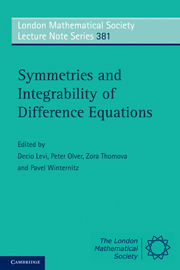Book contents
- Frontmatter
- Contents
- List of figures
- List of contributors
- Preface
- Introduction
- 1 Lagrangian and Hamiltonian Formalism for Discrete Equations: Symmetries and First Integrals
- 2 Painlevé Equations: Continuous, Discrete and Ultradiscrete
- 3 Definitions and Predictions of Integrability for Difference Equations
- 4 Orthogonal Polynomials, their Recursions, and Functional Equations
- 5 Discrete Painlevé Equations and Orthogonal Polynomials
- 6 Generalized Lie Symmetries for Difference Equations
- 7 Four Lectures on Discrete Systems
- 8 Lectures on Moving Frames
- 9 Lattices of Compact Semisimple Lie Groups
- 10 Lectures on Discrete Differential Geometry
- 11 Symmetry Preserving Discretization of Differential Equations and Lie Point Symmetries of Differential-Difference Equations
- References
4 - Orthogonal Polynomials, their Recursions, and Functional Equations
Published online by Cambridge University Press: 05 July 2011
- Frontmatter
- Contents
- List of figures
- List of contributors
- Preface
- Introduction
- 1 Lagrangian and Hamiltonian Formalism for Discrete Equations: Symmetries and First Integrals
- 2 Painlevé Equations: Continuous, Discrete and Ultradiscrete
- 3 Definitions and Predictions of Integrability for Difference Equations
- 4 Orthogonal Polynomials, their Recursions, and Functional Equations
- 5 Discrete Painlevé Equations and Orthogonal Polynomials
- 6 Generalized Lie Symmetries for Difference Equations
- 7 Four Lectures on Discrete Systems
- 8 Lectures on Moving Frames
- 9 Lattices of Compact Semisimple Lie Groups
- 10 Lectures on Discrete Differential Geometry
- 11 Symmetry Preserving Discretization of Differential Equations and Lie Point Symmetries of Differential-Difference Equations
- References
Summary
Abstract
These lectures contain a brief introduction to orthogonal polynomials with some applications to nonlinear recurrence relation. We discuss the spectral theory of orthogonal polynomials. We also mention other applications which may not be well known to the integrable systems community. For example we treat birth and death processes, the J-matrix method, and inversions of large Hankel matrices. The spectral theory of the Askey–Wilson operators on bounded and unbounded intervals is briefly mentioned.
Introduction
Many mathematicians and physicists think orthogonal polynomials are polynomial solutions of Sturm–Liouville differential equations. This is usually emphasized in textbooks written with an applied flavor. Although the Jacobi, Hermite, Laguerre polynomials and their special cases are indeed solutions to such equations, all orthogonal polynomials arise from difference equations. In addition to satisfying second order difference equations in the degree they may also satisfy an operator equation in a continuous variable.
In this article we include a brief account of certain aspects of orthogonal polynomials which may appeal to specialists in difference equations. In particular we give many instances in the theory of orthogonal polynomials where difference equations play a fundamental role. We also discuss the spectral theory of orthogonal polynomials and review the direct and inverse problems for orthogonal polynomials, which is the theory of linear symmetric second order difference equations. We also show how structure relations for orthogonal polynomials lead to nonlinear difference equations satisfied by the recurrence coefficients of the orthogonal polynomials under very special initial conditions.
- Type
- Chapter
- Information
- Symmetries and Integrability of Difference Equations , pp. 115 - 138Publisher: Cambridge University PressPrint publication year: 2011
References
- 1
- Cited by

